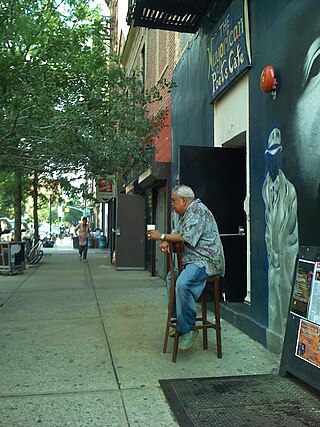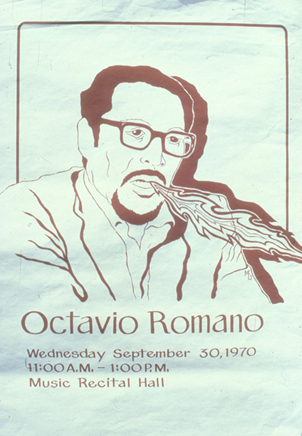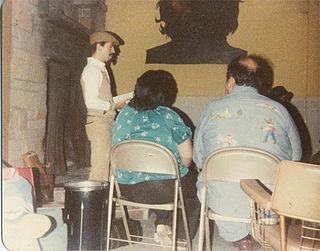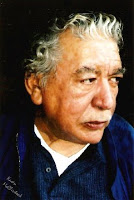Related Research Articles

Miguel Algarín Jr. was a Puerto Rican poet, writer, co-founder of the Nuyorican Poets Café, and a Rutgers University professor of English.

Quinto Sol was the first fully independent publishing house to surface from the Chicano movement in the Sixties. Editorial Quinto Sol was founded in 1967 at UC Berkeley by Octavio I. Romano, a professor of Behavioral Science and Public Health, in collaboration with Nick C. Vaca and Andres Ybarra. The name "Quinto Sol" is Spanish for "Fifth Sun" and it refers to the Aztec myth of creation and destruction. Since the beginning of the Chicano movement in the 1960s, this concept has become a pathway to cultural expression. The Fifth Sun has constantly been integrated into the music, art and literature of the Chicano idea.
José Antonio "Tony" Burciaga was an American Chicano artist, poet, and writer who explored issues of Chicano identity and American society.

Alberto Baltazar Urista Heredia, better known by his nom de plume Alurista, is an American poet and activist. His work was influential in the Chicano Movement and is important to the field of Chicano poetry.

Chicano poetry is a subgenre of Chicano literature that stems from the cultural consciousness developed in the Chicano Movement. Chicano poetry has its roots in the reclamation of Chicana/o as an identity of empowerment rather than denigration. As a literary field, Chicano poetry emerged in the 1960s and formed its own independent literary current and voice.

JesúsAbraham "Tato" Laviera was a Puerto Rican poet in the United States. Born Jesús Laviera Sanches, in Santurce, Puerto Rico, he moved to New York City at the age of ten, with his family, to reside in the Lower East Side. Throughout his life he was involved in various human rights organizations, but was best known as a renowned Nuyorican poet. An obituary for NBC Latino describes him as "one of the greatest representatives of the Nuyorican movement."

Lorna Dee Cervantes is an American poet and activist, who is considered one of the greatest figures in Chicano poetry. She has been described by Alurista as "probably the best Chicana poet active today."
Sandra María Esteves is a Latina poet and graphic artist. She was born and raised in the Bronx, New York, and is one of the founders of the Nuyorican poetry movement. She has published collections of poetry and has conducted literary programs at New York City Board of Education, the Caribbean Cultural Center, and El Museo del Barrio. Esteves has served as the executive director of the African Caribbean Poetry Theater. She is the author of Bluestown Mockinbird Mambo and Yerba Buena. She lives in the Bronx.

American literature in Spanish in the United States dates back as 1610 when the Spanish explorer Gaspar Pérez de Villagrá published his epic poem Historia de Nuevo México. He was an early chronicler of the conquest of the Americas and a forerunner of Spanish-language literature in the United States given his focus on the American landscape and the customs of the people. However, it was not until the late 20th century that Spanish language literature written by Americans was regularly published in the United States.

Luis Omar Salinas (1937–2008) was a leading Chicano poet who published a number of well-received collections of poetry, including the Crazy Gypsy, which has been described as "a classic of contemporary and Chicano poetry", I Go Dreaming Serenades, and Afternoon of The Unreal. He was awarded the Stanley Kunitz award by Columbia Magazine for one of his poems, and a General Electric Foundation Award. Salinas is regarded as "one of the founding fathers of Chicano poetry in America," with many of his poems being "canonized in U.S. Hispanic literature."

Francisco Xavier Alarcón was a Chicano poet and educator. He was one of the few Chicano poets to have "gained recognition while writing mostly in Spanish" within the United States. His poems have been also translated into Irish and Swedish. He made many guest appearances at public schools so that he could help inspire and influence young people to write their own poetry especially because he felt that children are "natural poets."

Andrés Montoya was a Chicano poet.

Chicana literature is a form of literature that has emerged from the Chicana Feminist movement. It aims to redefine Chicana archetypes, in an effort to provide positive models for Chicanas. Chicana writers redefine their relationships with what Gloria Anzaldúa has called "Las Tres Madres" of Mexican culture, by depicting them as feminist sources of strength and compassion.

Eduardo C. Corral is an American poet and MFA Assistant Professor in the Department of English at NC State University. His first collection, Slow Lightning, published by Yale University Press, was the winner of the 2011 Yale Younger Series Poets award, making him the first Latino recipient of this prize. His 2020 work, guillotine, was awarded the 2021 Lambda Literary Award for gay poetry and was longlisted for the 2020 National Book Award for Poetry.
Latino literature is literature written by people of Latin American ancestry, often but not always in English, most notably by Mexican Americans, Puerto Ricans, Cuban Americans, and Dominican Americans, many of whom were born in the United States. The origin of the term "Latino literature" dates back to the 1960s, during the Chicano Movement, which was a social and political movement by Mexican Americans seeking equal rights and representation. At the time, the term "Chicano literature" was used to describe the work of Mexican-American writers. As the movement expanded, the term "Latino" came into use to encompass writers of various Latin American backgrounds, including Mexican, Puerto Rican, Cuban, and others.
Judy A. Lucero was a Chicana prisoner poet, cited as a legend among Latina feminists. Lucero had a particularly tough life, becoming a heroin addict after being introduced to drugs at the age of eleven by one of her stepfathers, losing two children and dying in prison at the age of 28 from a brain hemorrhage.
Margarita Cota-Cárdenas is an American poet and author. A voice for Chicano literature, Cota-Cárdenas is known for her 1985 novella Puppet: A Chicano Novella and her works of poetry. She is a professor emerita of Spanish at Arizona State University.
José Angel Figueroa is a Puerto Rican poet, actor, author, editor, and a professor in the Humanities who has published poetry, fiction, and drama in the United States. He is best known for his poetry and is considered one of the first Neorican poets and contributed to the rise of the Nuyorican Literary movement. He was an early contributor to the Nuyorican Poets Café and has influenced the scene of Latino literature in New York through education, writing, and outreach.
Abelardo Barrientos Delgado, aka Lalo, was a Chicano writer, community organizer, and poet. His work was important in establishing the Chicano poetry movement.
References
- ↑ Ruiz, Vicki L.; Sanchez Korroll, Virginia, eds. (2006), "Zamora, Bernice B. Ortiz (1938-)", Latinas in the United States: A Historical Encyclopedia, Indiana University Press, pp. 818–819, ISBN 978-0-253-34680-3
- ↑ Cheuse, Alan (October 11, 1981). "The Voice of the Chicano". The New York Times.
- ↑ Kanellos, Nicolás (2008). The Greenwood encyclopedia of Latino literature . Greenwood Press. ISBN 9780313339707. OCLC 1038089084.
- ↑ "ZAMORA, BERNICE (b. 1938)". University of Nebraska–Lincoln.
- ↑ Kanellos, Nicolás (2008). The Greenwood encyclopedia of Latino literature . Greenwood Press. ISBN 9780313339707. OCLC 1038089084.
- ↑ "ZAMORA, BERNICE (b. 1938)". University of Nebraska–Lincoln.
- ↑ "Voices from the Gaps: Bernice Zamora". University of Minnesota. Retrieved June 16, 2012.
- ↑ Kanellos, Nicolás (2008). The Greenwood encyclopedia of Latino literature . Greenwood Press. ISBN 9780313339707. OCLC 1038089084.
- ↑ Kanellos, Nicolás (2008). The Greenwood encyclopedia of Latino literature . Greenwood Press. ISBN 9780313339707. OCLC 1038089084.
- ↑ Kanellos, Nicolás (2008). The Greenwood encyclopedia of Latino literature . Greenwood Press. ISBN 9780313339707. OCLC 1038089084.